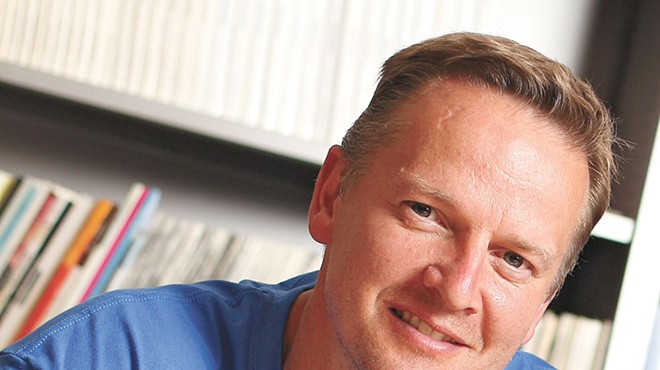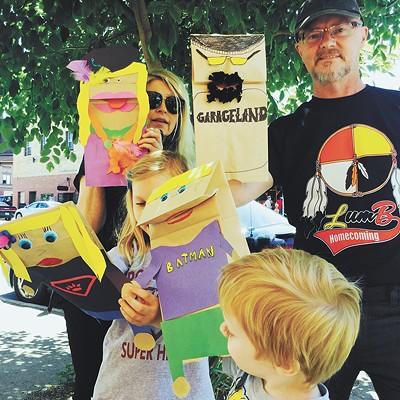I used to know how to read. I could read fast, I could read long, I could read chapter books.
I was the flashlight-under-the-covers sort of reader. The kid combing through yellowed paperbacks in the back room of his grandparents' house, scarfing up Crichton and Grisham and Michener — even Grandma's Nora Roberts book. I read Animal Farm standing up. I read War and Peace because it was long. I read Ulysses to seem smart and didn't understand a word of it.
I'd have to force myself at parties to concentrate on talking to the person in front of me instead of being sucked away by the temptations on the bookshelf behind me.
But then I grew up.
I still read, technically. I vacuum up quick-take blogs, skim through a million witty ephemeral tweets, and scan long-form journalism pieces. But the novel — the chapter book — has suddenly become hard to crack.
Ironically, the struggle began in the place that's supposed to be a haven for reading: college. It became easier, frankly, to watch pirated episodes of 24 or play video games than sit down with a novel. Super Smash Brothers, after all, is easier than Brothers Karamazov. Reading became harder, and everything else became easier.
It's a national trend: A 2014 Pew Poll found 23 percent of Americans admitted to not reading a single book in the past year, dramatically up from 8 percent in 1978. In the Internet age, being bored is obsolete. Beautiful Ruins author Jess Walter describes the challenge to me as "the constant bombardment of really fast information."
Entertainment comes cheap and quick, and so does emotion. "You can be really moved by a [YouTube video] of a really cute kitten riding a moped," Walter says. "And that doesn't take nearly the effort as Anna Karenina."
Ah, yes. Anna Karenina. The novel that, despite a valiant attempt by a beautiful woman across two years to get me to read it, I still couldn't get through, so she married someone else. It's joined on my dusty bookshelf by dozens of other important books — Jonathan Franzen! Philip Roth! Gabriel García Márquez! — that I've started but not finished and dozens more I've purchased and not started.
And here, there's the sense I've been cheating on my first love: These days, the laptop, not the paperback, comes to bed with me. See, a relationship with Netflix requires very little effort. Novels are high-maintenance. They get jealous. They demand long stretches of uninterrupted personal time. They demand solitude, a quiet room and a quiet mind.
My failure is all the more shameful in Spokane, which, judging by award-winning authors like Walter, Shawn Vestal and Sharma Shields, has a thriving literary scene. Spokane is writing what I should be reading.
But adulthood, with its jobs and marriages and taxes and children, can squeeze the life out of any reader. Even Shields, author of the short story collection Favorite Monster, can testify to that. She remembers working as a travel agent in Missoula, trapped in a cubicle, strapped to a headset.
"I didn't read any books the entire three years I worked there," Shields says. "I got so depressed because that part of my life was snuffed out."
Never again, she swore: She sought out jobs, instead, where reading was integral. But now, with two young kids, she has a different sort of challenge. "Usually I'm pretty exhausted when the night rolls around," Shields says. "I have a tougher time concentrating on the books."
Some harried adults slip in reading during breaks at work or when the kids go to sleep. Shields sits down beside her playing children, and slips in some reading amid the chaos.
For me, however, reading usually happens only where everything shiny and flashy is stripped away. A distant cabin. An airplane. Any place without Wi-Fi where books become the best source of entertainment by default.
Even then, the novel is often a slog for the first hour. For my Twitter-addled mind, the vastly different pace of a novel is like a first glance at a Magic Eye: confusing, dizzying, off-putting, obscure. Then finally, if I cross my eyes just right, everything snaps into focus. I become, once again, the reader I was as kid, immersed in characters, language, story and meaning.
"A lot of my favorite books, you have to learn how to read them... Ulysses, Blood Meridian, Proust," says Vestal, the local columnist who just won a PEN Literary Award. "Often I'll feel that after I've read for 15 and 20 minutes, something happens."
Adulthood's big struggle, after all, is having the willpower to choose between what is hard and what is easy, between what is filling and what is fulfilling. It takes intentional willpower to pass up the buffet of easier, more attractive entertainment. Reading in this age is a choice as simultaneously simple and impossible as swapping the curly fries for salad or the comforter for the stair-stepper.
It means leaving the laptop in the backpack and the phone on the dresser. It means turning on the bedside light, spending enough time between the covers and the pages for all the distractions and temptations to fade away. To once again learn how to read. ♦



























